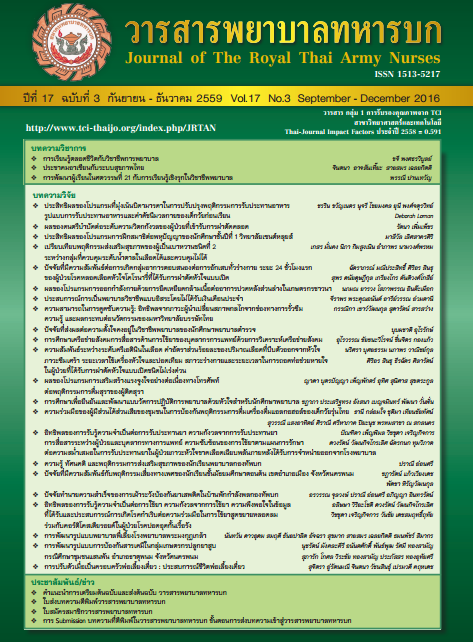การปรับตัวเมื่อเป็นครอบครัวพ่อเลี้ยงเดี่ยว : ประสบการณ์ชีวิตพ่อเลี้ยงเดี่ยว
Keywords:
พ่อเลี้ยงเดี่ยว, ครอบครัวเลี้ยงเดี่ยว, การปรับตัว, Single fathers, Single - parent families, AdaptationAbstract
การวิจัยนี้มีวัตถุประสงค์เพื่อศึกษาประสบการณ์ชีวิตการปรับตัวของพ่อเลี้ยงเดี่ยว ในรูปแบบการวิจัยเชิงคุณภาพโดยใช้ปรัชญาทฤษฎีปรากฏการณ์นิยมของเอ็ดมันด์ ฮุสเซิร์ล ร่วมกับกรอบแนวคิดทฤษฎีการปรับตัวของรอย ประชากรเป็นพ่อเลี้ยงเดี่ยว 6 คน เลือกแบบเฉพาะเจาะจง เก็บข้อมูลโดยการสัมภาษณ์แบบเจาะลึก วิเคราะห์ข้อมูลด้วยวิธีของโคไลซี่ ผลการวิจัยพบประเด็นหลัก 4 ประเด็น คือ 1) พ่อแม่ Two in one เป็นการปรับตัวเมื่อพ่อต้องสวมบทบาททั้งพ่อและแม่ การทำหน้าที่เลี้ยงดูบุตรแทนมารดา ทำหน้าที่ในการทำงานบ้านแทนแม่ และการปรับตัวเรื่องบทบาทหน้าที่การงาน 2) ชีวิตที่เปลี่ยนแปลง เป็นการปรับชีวิตส่วนตัวเมื่อต้องกลายเป็นพ่อเลี้ยงเดี่ยวในเรื่องปรับตัวเรื่องเวลาการพักผ่อน การปรับตัวเรื่องการทำงาน และเวลาในการทำกิจกรรมต่าง ๆ 3) จิตใจของชายที่เป็นพ่อเลี้ยงเดี่ยว เป็นการปรับจิตใจของพ่อเลี้ยงเดี่ยว พ่อเลี้ยงเดี่ยวมีความเครียดเรื่องเศรษฐกิจครัวเรือนรู้สึกเศร้าในการเสียคู่ชีวิต และรู้สึกวิตกกังวลในการตอบคำถามเกี่ยวกับแม่ 4) พ่อเลี้ยงเดี่ยวไม่เดียวดาย เป็นการปรับตัวด้านการพึ่งพา พ่อเลี้ยงเดี่ยวขอความช่วยเหลือพึ่งพาครอบครัว เพื่อนและคนรอบข้างเมื่อมีปัญหา ผลการศึกษาช่วยให้พยาบาลและทีมสุขภาพเข้าใจการเป็นพ่อเลี้ยงเดี่ยว การปรับตัวของพ่อเลี้ยงเดี่ยว และเป็นข้อมูลในการนำมาวางแผนในการดูแลครอบครัวพ่อเลี้ยงเดี่ยวให้มีความผาสุกต่อไป
The Adaptation of Single Father Families : The Life Experience of Single Fathers
The Qualitative research aims to conduct a study on the lived experience and adaptation of single fathers based on Edmund Husserl’s Phenomenology. Participants consisted of 6 single fathers who were selected by the purposive sampling. The data were collected by the in-depth interviews. The data analysis was made by using Colaizzi’s method. Four main results regarding the lived experience of single fathers based on Roy’s Adaptation Model included the following : 1) Two-in-one parents - This issue addressed the adaptation when single fathers had to take roles of both father and mother, i.e., to take care of their children instead of mothers, to do housework instead of mothers, and to engage in their career adaptation; 2) Changes in life - This issue addressed their personal life adaptation when they became single fathers, involving their adaptation in relation to relaxation time, career adaptation, and time for doing various activities; 3) Psychological conditions of single fathers - This issue addressed the psychological adaptation of single fathers, i.e., their stress due to household economics, sadness from losing their couples, and anxiety towards any questions about mothers; 4) Single fathers were not lonely - This issue addressed the adaptation regarding dependency, i.e., single fathers asked for assistance from their families, friends, and surrounding people when they had any problems. The results of the study enabled nurses and health team members to understand being and adaptation of single fathers, and to obtain the data for planning how to take care of single father’s families so as to ensure their well-being.
Downloads
Downloads
How to Cite
Issue
Section
License
บทความหรือข้อคิดเห็นใดใดที่ปรากฏในวารสารพยาบาลทหารบกเป็นวรรณกรรมของผู้เขียน ซึ่งบรรณาธิการหรือสมาคมพยาบาลทหารบก ไม่จำเป็นต้องเห็นด้วย
บทความที่ได้รับการตีพิมพ์เป็นลิขสิทธิ์ของวารสารพยาบาลทหารบก
The ideas and opinions expressed in the Journal of The Royal Thai Army Nurses are those of the authors and not necessarily those
of the editor or Royal Thai Army Nurses Association.






